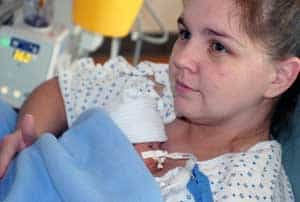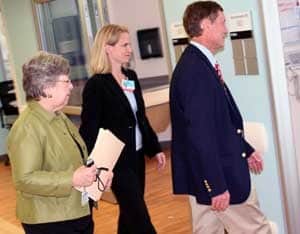UAMS Studying the Power of a Mother’s Touch
Oct. 8, 2010 | They say nothing quite compares to the power of a mother’s touch, and a groundbreaking study being done at the University of Arkansas for Medical Sciences (UAMS) aims to prove it. The study headed by Whit Hall, M.D., a professor of pediatrics and vice chief of the Section of Neonatology and chief of pediatrics service at UAMS, seeks to prove that periods of close physical contact between hospitalized premature babies and their mothers will not only increase infants’ positive development, but also decrease any pain resulting from early treatments. It’s called kangaroo care, and it’s been documented in several related clinical trials to restore the close relationship that the mother shared with the developing fetus prior to delivery. “We don’t really know exactly why it works,” Hall said. “But we know it works. We know in developing countries, for example, that it not only helps keep the babies warm but it also helps improve the baby’s survival rates. Our anecdotal experience is that the babies do better when they are with their mother.” The study is beneficial for Sunshine Ketcherside, of Jonesboro, who prematurely gave birth to daughter Elizebeth Christine at UAMS 12 weeks early. She was eager to participate and immediately begin reaping the benefits. “I absolutely love it. If it weren’t for the study I wouldn’t be able to hold my baby. And I love to hold her,” Ketcherside said. “It gives me the chance to have that bonding experience that helps us both.” Elizebeth Christine is one of as many as 120 premature babies born at UAMS that will be participating in the study in the next year. To be considered, babies must be estimated to be 27-to-30 weeks gestational age at birth, weigh more than 1,000 grams and be receiving assisted ventilation either in the form of complete mechanical ventilation or as oxygen supplementation. Anita Mitchell, Ph.D., associate professor in the UAMS College of Nursing and a co-investigator in the study, said premature babies are exposed to as many as a dozen painful procedures each day. The UAMS study will focus solely on babies receiving assisted ventilation, because these babies often don’t have a lot of close human contact due to the equipment they are connected to and their fragile state. “So far there is little known about whether kangaroo care can reduce pain experienced by these tiny babies,” Mitchell said. “This study is the first of its kind that will focus solely on those receiving assisted ventilation. We can look at saliva samples from the babies and test the level of cortisol, which is known as the stress hormone.” Hall says “the preliminary results show the cortisol level has decreased in many of these babies.” The study is funded through a $10.3 million grant extension received in 2009 by the UAMS Center for Translational Neuroscience through the Center of Biomedical Research Excellence (COBRE) program at the National Institutes of Health’s National Center for Research Resources. Charlotte Yates, Ph.D., a neurobiology researcher in the UAMS Center for Translational Neuroscience, said previous studies have proven the benefits of kangaroo care. “These include greater stability in breathing and heart rate,” she said. “Those babies have been shown to sleep longer, gain weight faster and cry less frequently. It’s also been shown to have several benefits for the mothers involved.” And that’s a statistic Ketcherside is already seeing. “My baby is doing great, and just getting to spend time every day holding her puts me at ease,” Ketcherside said. “I can tell it’s making her stronger.” |

